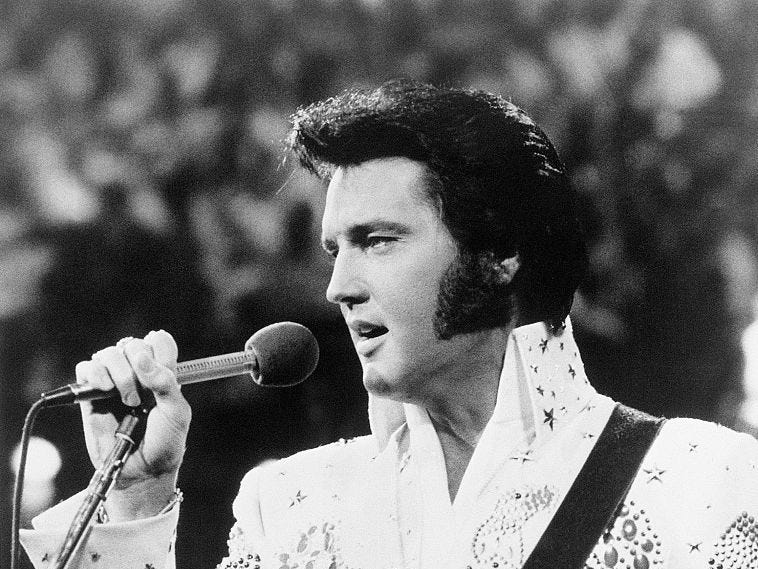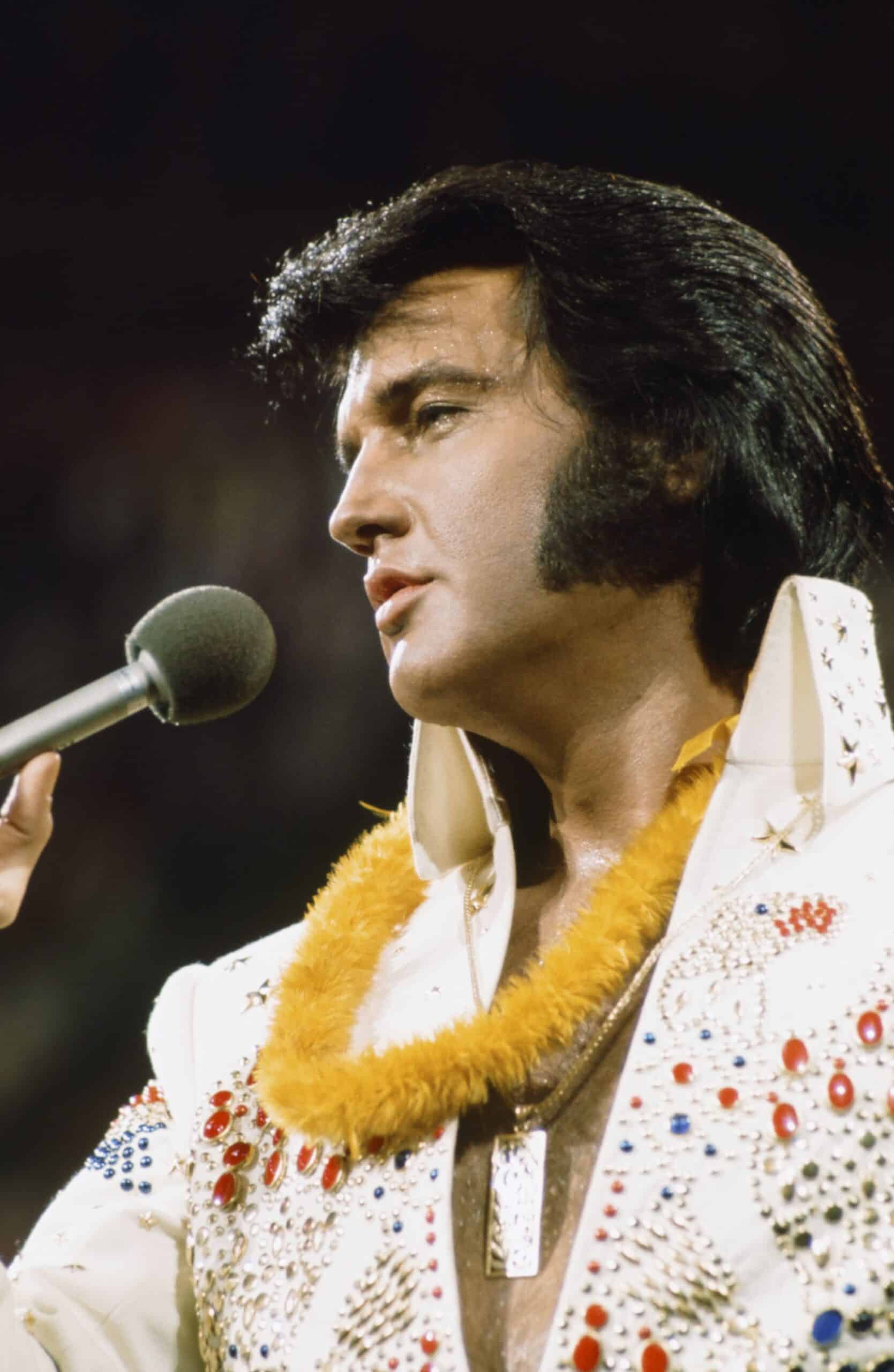When Did Elvis Presley Die? Unpacking The Life, Death, And Legacy Of The King Of Rock 'n' Roll
Elvis Presley’s passing is one of the most pivotal moments in music history, marking the end of an era for millions of fans around the globe. Known as the "King of Rock 'n' Roll," his life and career left an indelible mark on popular culture. The question "when did Elvis Presley die" continues to echo through the hearts of those who remain captivated by his story and his timeless music.
But there’s more to this story than just the date. Digging deeper into the circumstances surrounding Elvis Presley's death gives us a clearer picture of his personal struggles and the immense pressure that came with fame. In this article, we’ll explore the details of his life, the events leading up to his death, and the profound impact he’s had on music and pop culture. This isn’t just about remembering a legend—it’s about understanding the man behind the crown.
As we journey through the timeline of his life, we’ll uncover the factors that contributed to his untimely death and reflect on how his legacy continues to inspire new generations of fans. So grab a seat, because we’re about to dive into the life and times of one of the most iconic figures in music history.
Read also:Camilla Arauacutejo Onlyfans Leak What Happened And Why It Matters
Table of Contents:
- Elvis Presley's Biography
- Personal Information and Data
- Early Life and Rise to Fame
- Music Career and Achievements
- Health Issues and Struggles
- When Did Elvis Presley Die?
- Elvis Presley's Legacy
- Memorials and Tributes
- Influence on Music and Culture
- Conclusion
Elvis Presley's Biography: The Making of a Legend
Elvis Aaron Presley was born on January 8, 1935, in Tupelo, Mississippi. From the moment he stepped into the spotlight, he wasn’t just another musician—he was a phenomenon. Known for his electrifying stage presence and a voice that could melt hearts and ignite crowds, Elvis became a global icon. Over the course of his career, he released countless hit songs, starred in films, and performed in sold-out concerts all over the world. His influence extended far beyond music, shaping an entire generation and revolutionizing the industry itself.
Early Beginnings: Humble Roots and a Big Dream
Elvis grew up in a modest family, and his love for music began at a very young age. At just 10 years old, he stepped onto a stage for the first time, singing "Old Shep" at a local contest. That moment may not have seemed monumental at the time, but it was the spark that ignited a lifelong passion. His early exposure to gospel, blues, and country music laid the foundation for the unique sound that would later define him as the "King of Rock 'n' Roll."
Breakthrough and Fame: How Elvis Changed the Game
By the mid-1950s, Elvis had become a household name. Songs like "Heartbreak Hotel," "Hound Dog," and "Jailhouse Rock" weren’t just hits—they were cultural phenomena. His performances were a masterclass in charisma, blending rock 'n' roll with a touch of gospel and country. He didn’t just entertain; he revolutionized. The music industry had never seen anything quite like him, and audiences couldn’t get enough.
Personal Information and Data: The Man Behind the Crown
| Full Name | Elvis Aaron Presley |
|---|---|
| Date of Birth | January 8, 1935 |
| Place of Birth | Tupelo, Mississippi, USA |
| Date of Death | August 16, 1977 |
| Place of Death | Memphis, Tennessee, USA |
Early Life and Rise to Fame: From Tupelo to Memphis
Elvis’s early life was anything but glamorous. Born into a working-class family, he developed a deep love for gospel, blues, and country music. These influences would later shape his distinctive sound, setting him apart from his contemporaries. When the Presley family moved to Memphis, Tennessee, in 1948, it was a turning point. It was here that Elvis began exploring his musical talents and caught the attention of Sun Records founder Sam Phillips. This was the beginning of something extraordinary.
First Recordings: The Sound That Changed Everything
In 1954, Elvis recorded "That's All Right," which became his first single. This song wasn’t just a hit—it was a fusion of country and rhythm & blues that helped launch his career. Soon after, he signed with RCA Victor, and the rest, as they say, is history. With a string of successful albums and hit singles, Elvis was on his way to becoming a global sensation.
Read also:Revolutionizing Remote Access Dive Into Remoteiot Platform Ssh Android
Music Career and Achievements: A Legacy in Song
Elvis’s music career was nothing short of legendary. Over the course of his lifetime, he released more than 600 recordings, many of which topped the charts. His ability to blend genres like rock 'n' roll, gospel, and country set him apart from the rest. He wasn’t just a singer; he was a pioneer who redefined what music could be.
Key Achievements: The King's Crown Jewels
- Inducted into the Rock and Roll Hall of Fame in 1986
- Recipient of three Grammy Awards
- Over 1 billion records sold worldwide
- Starred in 31 feature films
Health Issues and Struggles: The Burden of Fame
Despite his immense success, Elvis faced numerous personal and health challenges later in life. The pressures of fame, combined with substance abuse, took a toll on his well-being. By the mid-1970s, his health had significantly deteriorated, affecting both his personal life and career. Fame may have crowned him a king, but it also carried a heavy burden.
Substance Abuse: A Dark Side of Stardom
Elvis struggled with prescription drug addiction, which became a major factor in his declining health. He was prescribed various medications to manage stress, pain, and sleep issues, but their misuse ultimately contributed to his premature death. It’s a reminder that even the brightest stars can face their own battles behind the scenes.
When Did Elvis Presley Die? The Final Chapter
Elvis Presley passed away on August 16, 1977, at the age of 42. He was found unresponsive at his Graceland mansion in Memphis, Tennessee. The official cause of death was listed as a heart attack, though investigations later revealed that drug-related complications may have played a role. It was a shocking end to a life that had touched so many.
Final Days: A Grueling Farewell
In the weeks leading up to his death, Elvis had been performing in a series of concerts across the United States. Despite showing signs of fatigue and illness, he continued to push through his grueling schedule. His final performance took place on June 26, 1977, in Indianapolis, Indiana. It was a bittersweet farewell to a career that had changed the world.
Elvis Presley's Legacy: A King Never Forgotten
Elvis’s impact on music and popular culture is immeasurable. Even decades after his death, his music continues to resonate with fans across generations. His influence can be seen in the work of countless artists who have cited him as an inspiration. He wasn’t just a musician—he was a cultural icon who changed the game forever.
Graceland and Tourism: A Shrine to the King
Elvis’s Graceland mansion has become a major tourist attraction, drawing visitors from all corners of the globe. The estate serves as a museum dedicated to his life and career, preserving his legacy for future generations. It’s a place where fans can step into the world of the King and feel a little closer to the man who changed everything.
Memorials and Tributes: Keeping the King Alive
Elvis’s memory is honored through various tributes and memorials. Annual events like the "Elvis Week" celebration in Memphis attract thousands of fans who gather to pay homage to the King of Rock 'n' Roll. Statues, monuments, and exhibits dedicated to his legacy can be found around the world. These tributes aren’t just about remembering a man—they’re about celebrating a legend.
Fans and Followers: A Community Built on Love
Elvis’s fan base remains as active and passionate as ever, organizing events, concerts, and charity drives in his honor. These activities help keep his spirit alive and ensure that his contributions to music are never forgotten. The King may be gone, but his kingdom endures.
Influence on Music and Culture: The King's Legacy Lives On
Elvis Presley’s influence extends far beyond music, shaping cultural norms and societal attitudes. His groundbreaking performances challenged racial barriers and brought diverse audiences together. His fashion sense, dance moves, and vocal style have inspired countless artists and remain iconic to this day. He wasn’t just a musician—he was a cultural force.
Cultural Impact: A Symbol of Rebellion and Freedom
Elvis’s impact on popular culture is evident in the way he redefined the role of musicians in society. He became a symbol of rebellion and freedom, resonating with audiences worldwide. His legacy continues to inspire new generations of artists and fans alike. The King may have left the stage, but his influence lives on in every note, every move, and every heart he touched.
Conclusion: The King of Rock 'n' Roll Lives Forever
Elvis Presley’s life and career remain a testament to his enduring influence on music and culture. The question "when did Elvis Presley die" may have an answer, but his legacy transcends time. His contributions to rock 'n' roll and his impact on society continue to inspire and captivate fans worldwide. He wasn’t just a star—he was a supernova.
We invite you to share your thoughts and memories of Elvis in the comments below. For more stories about music legends and cultural icons, explore our other content. Thank you for joining us on this journey through the life and times of the King of Rock 'n' Roll!
References:
- Rolling Stone Magazine
- Elvis Presley Enterprises
- Rock and Roll Hall of Fame
Article Recommendations

